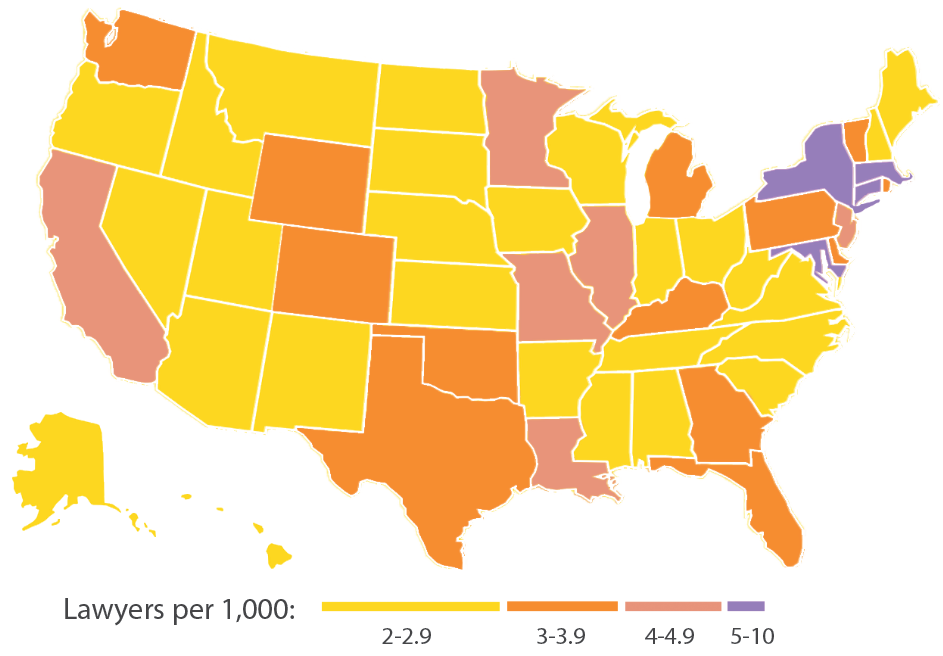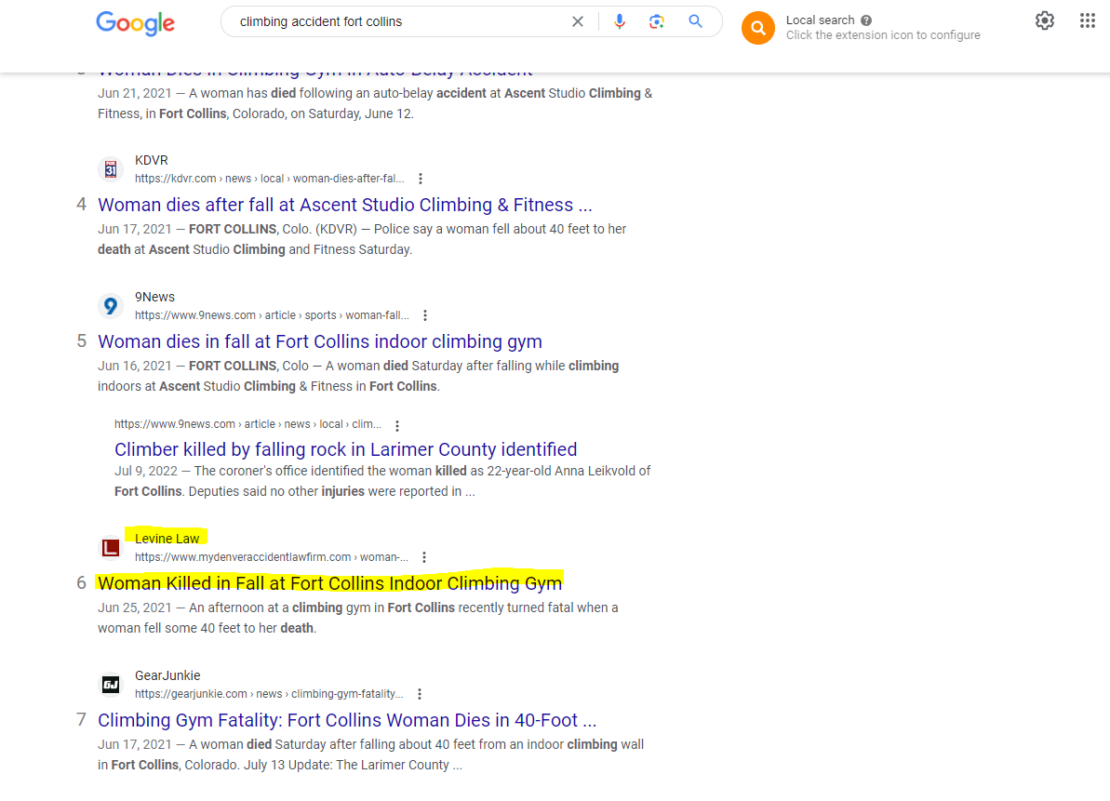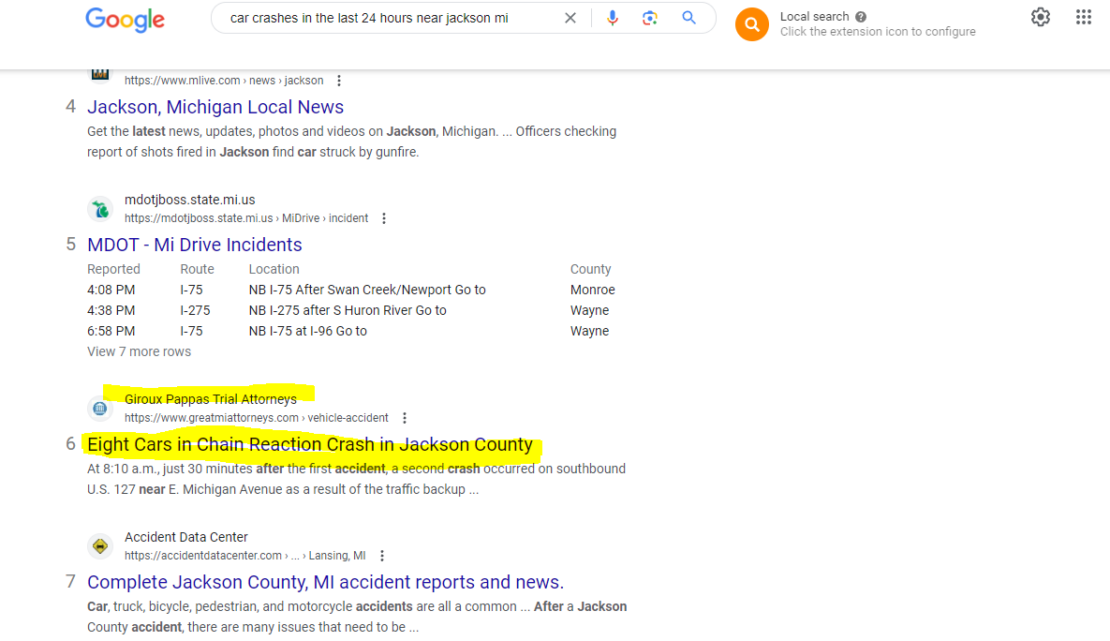Local Search Engine Optimization (SEO) for Lawyers
In today’s digitally oriented world, every local business website needs search engine optimization (SEO). Having your site appear at the top of local search result pages is critical to sustaining growth and remaining competitive. However, for lawyers and legal firms, intense local competition means your SEO strategy must be head and shoulders above the rest.
To outrank your competitors, your SEO strategy should be focused on three goals:
- Maintaining an optimized Google Business Profile, with many reviews and a description that includes targeted search phrases and service locations.
- Writing blogs and other informative content that provides direct answers to search queries.
- Connecting with local bar associations and other relevant organizations to secure backlinks from their websites to your own.
These are tried-and-true local SEO strategies that can be applied to any business, but they are especially crucial for lawyers and legal firms that will be going up against dozens of local competitors for a limited number of top-ranking spots. And it gets even more challenging if you practice in Washington, D.C., or New York, where the American Bar Association records the nation’s highest numbers of lawyers per capita:

Still, even if you’re practicing in rural Wyoming, you will at least have a few local competitors, so it’s a good idea to implement these SEO strategies as soon as you can.
Most search engine optimization for lawyers begins with the relatively simple task of creating and optimizing a Google Business Profile, so we’ll start there.
Google Business Profiles for Lawyers
Creating a Google Business Profile (GBP) is simple enough, and there are plenty of articles about that, so we’ll focus on how to make yours more effective than your competitors’ listings.
One of Google’s main factors for local search rankings is the acronym E-E-A-T: experience, expertise, authoritativeness, and trustworthiness. Google needs to identify a certain level of competence and professionalism in your profile to rank it higher. The best way to boost the E-E-A-T of your profile is to get as many good customer reviews as possible. Using a variety of tips and incentives, you should aim to collect at least 10 reviews to start.
Beyond that, your profile should include the following:
1. Accurate contact information, including a verifiable address or service area, and a link to your website.
2. Photos of your practice, including founding partners, associate lawyers, paralegals, and other team members.
3. A description that includes keywords and search phrases related to your niche or specialty. This is where keyword research comes in (an experienced SEO firm like Momentum can help with this, but you can also study the profiles of high-ranking competition to see what they include).
4. Posts that discuss major case studies/wins. Potential clients (and Google) should see that you’ve helped others with similar legal needs.
SEO Blogging for Lawyers
Thanks to a recent algorithm update, Google sets higher standards for ranking content in certain industries, including legal. Google’s concept of “Your Money Your Life” (YMYL) refers to specific topics that could have an outsized effect on a person’s financial or physical well-being, meaning that blog posts about child custody law, for instance, will be more heavily scrutinized by the search engine than a blog about how to change your own oil.
Knowing this, it is imperative that your blog posts offer accurate and highly sought-after information about your legal niche. Like the business profile description, nailing your blog strategy begins with keyword research. What types of questions are your potential clients typing into Google? Do some digging and figure that out (again, an experienced SEO agency is a huge help here), then create a list of answers to those questions. This should give you a list of specific blog topics demonstrating your authority and expertise in this space.
And don’t just focus on answering search queries—look at other blogs that attempt to answer the same questions and offer something more. The YMYL factor means that your content must meet the highest standards of credibility, so it is worth putting extra time and effort into these posts.
Answer Questions & Think Local
Another effective blogging strategy for lawyers is to create posts that put current or local events in a legal context. For example, if you are an accident or injury attorney, you can create a blog post that includes local traffic or injury statistics, problem streets or areas, and advice on handling the aftermath of a traffic accident. Or, if you practice in an area with many factories and other injury-prone workplaces, you can write about common workplace safety violations and the rights of injured workers.
Here are two examples of high-ranking blog posts from law firms that wrote about a local event:


If you’ve done this right, within a few months, these posts should start yielding more local traffic. You’re already a local authority offline, but targeted blogging also makes you a local authority online!
Make Local Connections for Backlinks
Backlinks—links to your website from another website—are a critical part of SEO, but because of factors like E-E-A-T and YMYL, they are arguably more important when it comes to legal SEO.
Google wants to see that others with similar expertise consider you an authority, too. The end goal is getting reputable local sites to link to yours, building up your credibility in the eyes of search engines. Here are a few tips for doing that:
- Reach out to other law firms outside of your niche so that they can recommend clients to you when they have a need for your specialty. For example, consider writing guest blogs for other legal websites that are commonly related to or just outside your specialty.
- Have your practice listed in business directories, such as the local bar association and chamber of commerce. You can find these on your own, but SEO agencies like Momentum have tools to ensure you’re listed everywhere you need to be.
- Have a strong social media presence, with at least a few posts per month.
- Create a “Resources” page on your website that includes tools like legal fee calculators, child support calculators, or charts that help readers understand certain legal processes.
SEO: A Foundation to Grow Your Firm
The three-pronged SEO strategy outlined in this post will ensure your law firm’s website gets the traffic it needs to increase online visibility. In addition to optimizing your business profile, writing great blogs, and getting backlinks, ensure your website is properly functioning and up to date. It may take a good amount of legwork, but proper execution of this strategy will help you build an excellent foundation for effective local SEO and a thriving business.
If you need help building a local SEO strategy or have questions about the techniques we’ve outlined in this blog post, please schedule a consultation with one of our experts at Momentum. For over a decade, we’ve helped small- to mid-sized businesses in many industries grow their businesses online.
